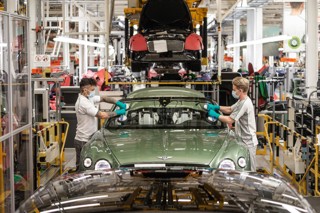Bentley has outlined a major new sustainability plan that will see an end to its famous large-capacity combustion engines to become a fully-electrified luxury car brand within 10 years.
The Volkswagen Group-owned OEM has said it will only sell plug-in hybrid or electric vehicles (EVs) by 2026 and will switch to EV-only by 2030.
Named Beyond100, the plan is expected to see Bentley transform from being the world’s largest producer of 12-cylinder engines to become a leader in suitable luxury mobility within a decade.
Adrian Hallmark, chairman and CEO of Bentley Motors, said: “Since 1919, Bentley has defined luxury grand touring. Being at the forefront of progress is part of our DNA - the original Bentley boys were pioneers and leaders. Now, as we look Beyond100, we will continue to lead by reinventing the company and becoming the world’s benchmark luxury car business.
“Driving this change includes, and also goes beyond our products, delivering a paradigm shift throughout our business, with credibility, authenticity, and integrity. Within a decade, Bentley will transform from a 100-year-old luxury car company to a new, sustainable, wholly ethical role model for luxury.”
Having already committed that every model line will be offered with the option of a hybrid variant by 2023, Bentley will launch two new plug-in hybrids in 2021, joining the existing Bentayga Hybrid.
Its first pure electric model will be launched in 2025.
Last year, Bentley’s production facility in Crewe became the first luxury automotive factory in the UK to be certified carbon neutral by the Carbon Trust. This followed two decades of implementing solutions, including a water recycling system in the paint shop, local tree planting, installation of a 10,000 solar panel carport, taking the total number of on-site solar panels to 30,000, and a switch to renewable-only electricity sources.
The Crewe facility will continue to improve its environmental operations. By the end of this year, all suppliers will have passed a sustainability audit, verifying their sustainability credentials. In the future, by the end of 2025, the company intends to reduce its factory environmental impact by focusing on energy consumption, CO2 emissions, waste water, use of solvents in the paint process and becoming plastic neutral. This will result in a climate positive factory by 2030, actively reducing levels of carbon in the atmosphere, while in parallel the business invests in renewable energy and forestation projects.
In June, Bentley announced plans to shed 1,000 jobs in the UK under a “voluntary release programme” after the coronavirus pandemic hastened a drive to cut costs. This figure was reduced to 800 colleagues, including around 200 contractor positions.
Bentley says it is now in a position to achieve a positive financial performance for the full year 2020, in spite of the extenuating external circumstances.


















Login to comment
Comments
No comments have been made yet.